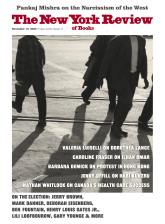In response to:
Speech and Slavery in the West Indies from the August 20, 2020 issue
To the Editors:
Fara Dabhoiwala in “Speech and Slavery in the West Indies” [NYR, August 20] makes two claims that cannot be correct. As one of the scholars working on the www .slavevoyages.org site, which he kindly references, I would like to suggest that he has not looked at our work very closely. First, each of the 36,000 transatlantic voyages on the site allows for three disembarkation points, not one as he claims. But more important, the site offers an intra-American slave trade database containing a further 11,400 voyages through which it is possible to track the movement of Africans in the Americas after their initial disembarkation. The author seems unaware of what the site offers.
Such unawareness leads directly to a second and much larger issue. The author claims that
slavery was foundational to Britain’s prosperity and rise to global power. Throughout the eighteenth century the empire’s epicenter lay not in North America, Africa, or India but in a handful of small sugar-producing Caribbean islands.
However, the Slave Voyages databases show clearly that both Portugal and Spain, separately, forced far more Africans to cross the Atlantic than did the British—important slavers though the British undoubtedly were. More important, the value of Spanish American exports far exceeded those of the British Caribbean (and more broadly the British Americas) throughout the colonial period.
How is it possible that having larger slave systems than the British failed to trigger “prosperity and rise to global power” in the case of Portugal and Spain? For the Iberians, the emergence of dominant slave trades and slave systems appears to be associated with diminishing prosperity and power. Could it be that the rise of nations and imperial systems is a little more complicated than what the author is prepared to concede?
David Eltis
Emeritus Professor of History
Emory University
Atlanta, Georgia
Adjunct Professor of History
University of British Columbia
Vancouver, Canada
Fara Dabhoiwala replies:
I am by no means the first scholar whom David Eltis has accused of, in his view, exaggerating the historical importance of European slavery. As an economic historian, his own work has been concerned primarily with quantifying the size and economic impact of transatlantic slave regimes. That is a valuable approach, with a distinguished and contentious historiography dating back to Eric Williams’s pioneering Capitalism and Slavery (1944). But it is only one, relatively narrow, way of understanding the overall significance of slavery, and it can lead to the conclusion that, in fact, its import was not all that great. My essay, by contrast, like the books it discussed, considered slavery not merely as an economic institution but as part of the political, military, social, intellectual, and cultural foundations of the early British Empire.
As for the data in slavevoyages.org, readers can use the site themselves to check my general calculations (at “Transatlantic/Estimates/Tables,” select for 1701–1800, “100-year periods,” “Broad disembarkation regions,” and “Embarked/Disembarked”). I’m happy to endorse Professor Eltis’s plug for the site’s many additional capabilities.



